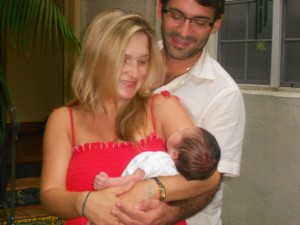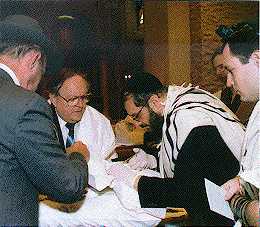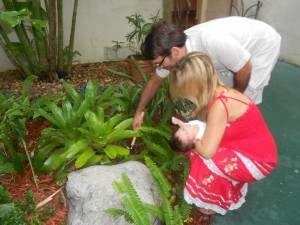 Two days after giving birth, when we arrived back at our house and I burst into tears overwhelmed by the enormity of how my life had just changed, and how I was now responsible for a little being who depended on me for her survival and whom I was still learning to feed, hold, and handle, I had a moment of calm in which I thought: “At least I don’t have to plan a bris.”
Two days after giving birth, when we arrived back at our house and I burst into tears overwhelmed by the enormity of how my life had just changed, and how I was now responsible for a little being who depended on me for her survival and whom I was still learning to feed, hold, and handle, I had a moment of calm in which I thought: “At least I don’t have to plan a bris.”
Now, given that I’m not Jewish, I’ll never have to plan a bris, the circumcision celebration for an eight day old baby boy. And given that my only child so far is a girl, I’m an even less likely candidate for bris-having. But I’ve been to a few friends’ sons’ brises, and while I thoroughly enjoyed them at the time, not having babies of my own yet, I did not understand the magnitude of the mother’s achievement: she gave birth, then immediately planned a party!
I don’t have strong feelings about circumcision, and the brises I’ve attended were lovely, surgical ceremony aside. The parents announced the baby’s name, describing why they chose to call him what they did, often tearing up as they explained that the baby was named in memory of a beloved, deceased relative. There was singing and brunch. I love brunch and teary-eyed, joyous parents.

So I have nothing against brises, but two days into motherhood I was in no shape to be planning a party. My godson’s mother recalls her roommate in the recovery room calling a caterer to make arrangements for her son’s bris. Anonymous mother of a now six year old, I salute you! That woman was on the ball. Me? I was bloated. I was emotional. And I really needed my highlights done.
Still, as each day passed and I settled into my new life, I wanted to do something to celebrate Amalía’s birth beyond just taking her to a sunset happy hour when she was one week old. I wanted to connect her to a larger whole. I had said my prayers of gratitude, and I’m going to take her to church for a blessing when she’s 40 days old, which is what Orthodox Christians do. (More on that in later posts.) She’ll have a baptism eventually; it will be larger and out of state, and, I imagine, more painful to plan than a bris-type brunch. But at least my hormones and, I hope, my weight, will have leveled off by then.
Still, I wanted to do something immediate to celebrate the amazing everyday miracle of this new life. Then, as so often happened in the first few weeks after her birth, one of Amalía’s three grandmas came to the rescue. Before she returned to Nicaragua, Abuelita Carmen told me that there, it’s common to bury a baby’s umbilical cord stump once it falls off, to return it to Mother Earth in gratitude for the gift of being given a baby.
I liked that idea. And I did a little research while Amalía slept. A babycenter.com messageboard discussing what to do with umbilical cords suggested keeping the stump–and the clamp it came in–in a scrapbook. But somehow that sounded very CSI to me, a clump of DNA being pressed like a flower between archival pages.

Another respondent said that in Chinese culture, the cord is saved and given to the child later for good luck–her own son’s cord was awaiting that day in a vacuum sealed pouch. That mother had also shaved her son’s head when he was four months old and made a calligraphy brush out of the baby hair, “said to be the highest quality brush for this art form,” which strikes me as a very cool method of recycling.
And then I saw a message from someone who wrote: “We planted a tree in our backyard and buried our son’s stump under it with a silver dollar. According to Native American legend, this is supposed to ensure the child grows big and strong like a tree and always has $ in his pocket.”
Amalía’s cord fell off exactly seven days after she was born. By then, she was feeding well and only waking up once per night, and I was feeling like my old self again. Maybe I could have even hosted a bris if need be?
Instead, we went out into our courtyard, expressed our thanks to Mother Earth and anyone else, human or Divine, we could think of, and buried her stump in our courtyard, near the palm trees. We forgot the silver dollar, but that’s OK, as with all of parenthood, we’re passing on the parts of traditions we can and making up the rest as we go along.

We rent this apartment and won’t be here forever, so, unlike some people on the babycenter board, we won’t be able to photograph Amalía by the tree every year. But the apartment sheltered us as we became a family, and when we move, we’ll have left a little bit of gratitude, and some DNA, behind.